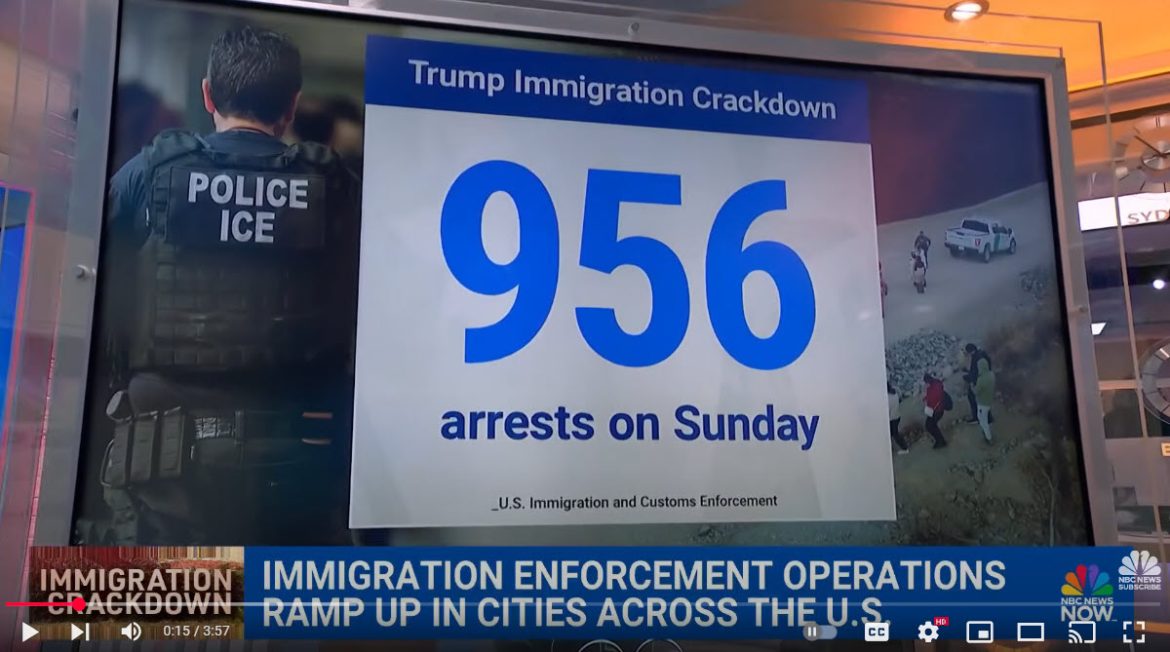The Trump administration continues to highlight its immigration enforcement efforts, touting record-breaking arrests by Immigration and Customs Enforcement (ICE) agents as part of a broader crackdown on undocumented immigrants. Over 956 individuals were arrested in nationwide immigration raids on Sunday, bringing the total number of arrests to 2,681 since President Donald Trump’s inauguration. The administration defends its actions as a vital component of its promise to secure U.S. borders and protect national security, though critics argue the methods used have sparked fear and confusion in communities across the country.
ICE reports that many of the recent arrests targeted individuals with prior criminal records or pending charges. However, the agency acknowledges that some “collateral arrests” were made, involving undocumented immigrants without criminal records who happened to be present during raids. According to border czar Tom Homan, the raids are “targeted operations” focusing on cities such as Chicago, Denver, and Atlanta. Homan insists that the raids are necessary to protect public safety, stating that the administration is prioritizing individuals who pose the greatest threat to communities.
The enforcement measures are not limited to public spaces. Federal authorities have extended arrest powers to sensitive locations, including churches and schools. In San Antonio, Texas, Bexar County Sheriff Javier Salazar confirms that local deputies are cooperating with federal agents but emphasizes that their primary focus remains on apprehending violent offenders. Salazar vows to respect people’s rights to access places of worship and education, though he acknowledges that investigations may lead to arrests in these locations.
The expansion of enforcement powers has raised concerns among advocacy groups, who warn of the chilling effect these measures may have on immigrant communities. Critics argue that targeting sensitive locations erodes trust and discourages individuals from seeking essential services or reporting crimes.
As part of its efforts to justify the crackdown, the Trump administration has launched a social media campaign showcasing what it calls the “worst criminals” arrested by ICE since President Trump’s inauguration. The White House’s thread on X highlights individuals accused of serious crimes such as human trafficking, drug smuggling, and violent offenses. The administration credits ICE agents for “working tirelessly to protect our communities” and points to the campaign as evidence of its commitment to law and order.
While supporters praise the campaign for bringing transparency to ICE’s efforts, critics view it as a divisive strategy that vilifies entire communities. Immigrant rights advocates contend that the focus on a few high-profile cases misrepresents the broader impact of immigration raids, which often result in the detention of individuals with no prior criminal history.
The administration’s aggressive stance on immigration is not without complications. On Sunday, President Trump announced retaliatory measures against Colombia after the South American nation initially refused to accept two U.S. military deportation flights carrying Colombian nationals. Trump’s proposed measures included tariffs, visa sanctions on Colombian officials, and enhanced inspections of Colombian nationals and cargo. Hours later, Colombian President Gustavo Petro reversed course, ordering his presidential plane to facilitate the repatriation of deported Colombians.
The situation underscores growing tensions between the U.S. and its regional partners, as countries push back against U.S. immigration policies. Colombia’s initial refusal and subsequent compliance highlight the delicate balance between maintaining diplomatic ties and adhering to domestic policies.
Adding to the complexity, Mexican drug cartels are reportedly planting explosives along roadways in Tamaulipas, just across the Texas border. Authorities from both countries have issued urgent warnings, urging travelers to exercise extreme caution. Flyers posted in Tamaulipas show images of the explosives and warn residents not to touch or manipulate them. The escalating cartel violence further fuels the Trump administration’s narrative of a border crisis, with officials pointing to such incidents as justification for heightened enforcement measures.
The administration’s immigration crackdown has sparked fierce debate across the country. Supporters view the raids as a necessary step to uphold the rule of law and address national security concerns, while critics argue that the measures disproportionately target vulnerable communities and undermine the values of inclusivity and compassion.
Meanwhile, migrant caravans continue to move through southern Mexico, undeterred by President Trump’s threats of tariffs and sanctions. Over 2,000 migrants are reportedly walking toward the U.S., further intensifying the administration’s focus on border security and deportation efforts.
As immigration enforcement intensifies, the Trump administration faces mounting pressure to balance its hardline policies with humanitarian considerations and international diplomacy. The outcomes of these measures will likely shape the immigration debate for years to come.



